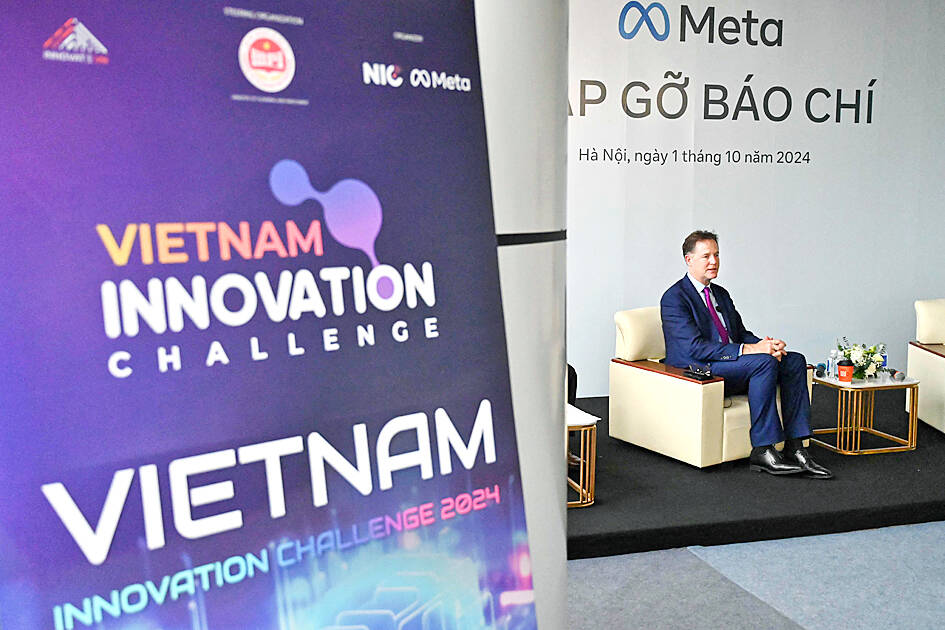Facebook parent Meta Platforms Inc will produce its next-generation virtual reality and augmented reality headsets in Vietnam, creating more than 1,000 jobs, the company said yesterday.
Speaking at a tech conference in Hanoi, Meta president of global affairs Nick Clegg said that the firm would focus on the production of the Quest 3S headset in the Southeast Asian country.
“We will, with our local partners, be manufacturing them here in Vietnam, and we estimate that this will create well over 1,000 new jobs,” he said.

Photo: AFP
Vietnam — long a low-cost destination to make clothes, shoes and furniture — is eyeing a rapid climb up the global supply chain.
The Vietnamese government last week said that Elon Musk’s SpaceX plans to invest US$1.5 billion in the country.
Vietnam is particularly intent on developing its capabilities in the lucrative chip industry, with global supply chain shocks and fears about US reliance on China for key resources boosting investment there.
Facebook is widely used in Vietnam and Clegg said the nation was among the global leaders in using its Messenger platform “not just to send messages to family and friends, but actually communicate with businesses and so foster trade and commerce across the country.”
However, Facebook has also faced criticism from human rights groups in the past few years for blocking content deemed illegal by the country’s government.
Facebook is a popular platform for rights advocates in Vietnam, where all independent media are banned.

SEMICONDUCTORS: The German laser and plasma generator company will expand its local services as its specialized offerings support Taiwan’s semiconductor industries Trumpf SE + Co KG, a global leader in supplying laser technology and plasma generators used in chip production, is expanding its investments in Taiwan in an effort to deeply integrate into the global semiconductor supply chain in the pursuit of growth. The company, headquartered in Ditzingen, Germany, has invested significantly in a newly inaugurated regional technical center for plasma generators in Taoyuan, its latest expansion in Taiwan after being engaged in various industries for more than 25 years. The center, the first of its kind Trumpf built outside Germany, aims to serve customers from Taiwan, Japan, Southeast Asia and South Korea,

Gasoline and diesel prices at domestic fuel stations are to fall NT$0.2 per liter this week, down for a second consecutive week, CPC Corp, Taiwan (台灣中油) and Formosa Petrochemical Corp (台塑石化) announced yesterday. Effective today, gasoline prices at CPC and Formosa stations are to drop to NT$26.4, NT$27.9 and NT$29.9 per liter for 92, 95 and 98-octane unleaded gasoline respectively, the companies said in separate statements. The price of premium diesel is to fall to NT$24.8 per liter at CPC stations and NT$24.6 at Formosa pumps, they said. The price adjustments came even as international crude oil prices rose last week, as traders

Taiwan Semiconductor Manufacturing Co (TSMC, 台積電), which supplies advanced chips to Nvidia Corp and Apple Inc, yesterday reported NT$1.046 trillion (US$33.1 billion) in revenue for last quarter, driven by constantly strong demand for artificial intelligence (AI) chips, falling in the upper end of its forecast. Based on TSMC’s financial guidance, revenue would expand about 22 percent sequentially to the range from US$32.2 billion to US$33.4 billion during the final quarter of 2024, it told investors in October last year. Last year in total, revenue jumped 31.61 percent to NT$3.81 trillion, compared with NT$2.89 trillion generated in the year before, according to

PRECEDENTED TIMES: In news that surely does not shock, AI and tech exports drove a banner for exports last year as Taiwan’s economic growth experienced a flood tide Taiwan’s exports delivered a blockbuster finish to last year with last month’s shipments rising at the second-highest pace on record as demand for artificial intelligence (AI) hardware and advanced computing remained strong, the Ministry of Finance said yesterday. Exports surged 43.4 percent from a year earlier to US$62.48 billion last month, extending growth to 26 consecutive months. Imports climbed 14.9 percent to US$43.04 billion, the second-highest monthly level historically, resulting in a trade surplus of US$19.43 billion — more than double that of the year before. Department of Statistics Director-General Beatrice Tsai (蔡美娜) described the performance as “surprisingly outstanding,” forecasting export growth